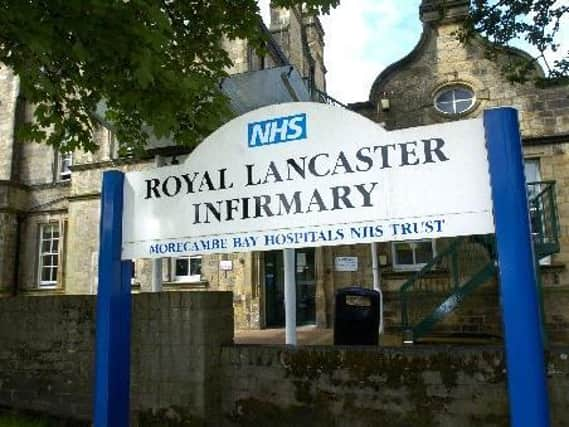Morecambe Bay health bosses send 'we're open' message to everyone during coronavirus crisis


The message is: “we’re open, let us help you”.
There is a worry that people are putting themselves or their loved ones at risk by not seeking urgent help when it’s needed.
Dr Geoff Jolliffe, chair of NHS Morecambe Bay Clinical Commissioning Group and a GP, said: “Morecambe Bay has been brilliant at staying home to save lives, but if you or someone you are with shows signs of a serious, life-threatening Illness or injury they must go to hospital.
Advertisement
Hide AdAdvertisement
Hide Ad"We are very worried that people who may be experiencing a heart attack or stroke are putting off coming to hospital. A&E attendances at our three hospitals are now 66 per cent fewer than the same time last year. The NHS is under immense pressure, but these illnesses and diseases haven’t gone away.
“All of our NHS services are still working for you, to keep you safe and well.”
Dr Shahedal Bari, Medical Director at University Hospitals of Morecambe Bay NHS Foundation Trust (UHMBT) said: “If you are suffering with a health issue and have doubts, please do not hesitate to seek help. We would rather you called 999 or attended the A&E to find an honest mistake has been made than be too late to save a person's life.
“People can be nervous at the best of times about coming into hospital, and we understand the feeling of uncertainty right now during the Coronavirus pandemic. The Doctors and Nurses may look a little different at the moment, but it’s for everyone’s safety. If you are seriously ill, please don’t let that put you off coming to hospital for an emergency. We have COVID and COVID free areas to look after people with different needs.”
The symptoms of a heart attack can include:
Advertisement
Hide AdAdvertisement
Hide Ad• chest pain – a sensation of pressure, tightness or squeezing in the centre/left side of your chest
• pain in other parts of the body – it can feel as if the pain is travelling from your chest to your arms (usually the left arm is affected, but it can affect both arms), jaw, neck, back and tummy (abdomen)
• sweating
• feeling lightheaded or dizzy
• shortness of breath
• feeling sick (nausea) or being sick (vomiting)
• an overwhelming sense of anxiety (similar to having a panic attack)
In some cases, there may not be any chest pain at all, especially in women, older people, and people who have diabetes. Although the chest pain is often severe, some people may only experience minor pain, similar to indigestion. It's the overall pattern of symptoms that helps to determine whether you are having a heart attack.
Advertisement
Hide AdAdvertisement
Hide AdIf you suspect you or someone else is having a stroke, phone 999 immediately and ask for an ambulance.
Even if the symptoms disappear while you're waiting for the ambulance, it's still important to go to hospital for an assessment.
The main stroke symptoms can be remembered with the word FAST:
• Face – the face may have dropped on 1 side, the person may not be able to smile, or their mouth or eye may have drooped.
Advertisement
Hide AdAdvertisement
Hide Ad• Arms – the person may not be able to lift both arms and keep them there because of weakness or numbness in 1 arm.
• Speech – their speech may be slurred or garbled, or the person may not be able to talk at all despite appearing to be awake; they may also have problems understanding what you're saying to them.
• Time – it's time to dial 999 immediately if you notice any of these signs or symptoms.
Once you arrive at hospital, you will be referred to a specialist for further tests to help determine the cause of the stroke. Treatment can also begin if necessary.
Advertisement
Hide AdAdvertisement
Hide AdSymptoms of a stroke that disappear quickly and in less than 24 hours may mean you had a transient ischaemic attack (TIA). These symptoms should also be treated as a medical emergency to reduce the chances of having another stroke.
The signs and symptoms of a stroke vary from person to person, but usually begin suddenly.